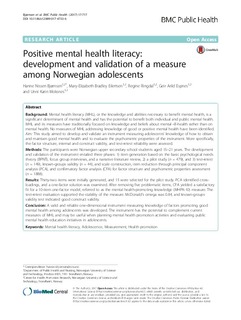| dc.contributor.author | Bjørnsen, Hanne Nissen | |
| dc.contributor.author | Eilertsen, Mary-Elizabeth B | |
| dc.contributor.author | Ringdal, Regine | |
| dc.contributor.author | Espnes, Geir Arild | |
| dc.contributor.author | Moksnes, Unni Karin | |
| dc.date.accessioned | 2018-01-02T14:27:59Z | |
| dc.date.available | 2018-01-02T14:27:59Z | |
| dc.date.created | 2017-09-19T15:52:26Z | |
| dc.date.issued | 2017 | |
| dc.identifier.issn | 1471-2458 | |
| dc.identifier.uri | http://hdl.handle.net/11250/2474133 | |
| dc.description.abstract | Background: Mental health literacy (MHL), or the knowledge and abilities necessary to benefit mental health, is asignificant determinant of mental health and has the potential to benefit both individual and public mental health.MHL and its measures have traditionally focused on knowledge and beliefs about mental -ill-health rather than onmental health. No measures of MHL addressing knowledge of good or positive mental health have been identified.Aim: This study aimed to develop and validate an instrument measuring adolescents’ knowledge of how to obtainand maintain good mental health and to evaluate the psychometric properties of the instrument. More specifically,the factor structure, internal and construct validity, and test-retes t reliability were assessed.Methods: The participants were Norwegian upper second ary school students aged 15–21 years. The developmentand validation of the instrument entailed three phases: 1) item generation based on the basic psychological needstheory (BPNT), focus group interviews, and a narrative literature review, 2) a pilot study (n = 479), and 3) test-retest(n = 149), known-groups validity (n = 44), and scale construction, item reduction through principal componentanalysis (PCA), and confirmatory factor analysis (CFA) for factor structure and psychometric properties assessment(n = 1888).Results: Thirty-two items were initially generated, and 15 were selected for the pilot study. PCA identified cross-loadings, and a one-factor solution was examined. After removing five problematic items, CFA yielded a satisfactoryfit for a 10-item one-factor model, referred to as the mental health-promoting knowledge (MHPK-10) measure. Thetest-retest evaluation supported the stability of the measure. McDonald’s omega was 0.84, and known-groupsvalidity test indicated good construct validity.Conclusion: A valid and reliable one-dimensional instrumen t measuring knowledge of factors promoting goodmental health among adolescents was developed. The instrument has the potential to complement currentmeasures of MHL and may be useful when planning mental health promotion activities and evaluating publicmental health education initiatives in adolescents. | nb_NO |
| dc.language.iso | eng | nb_NO |
| dc.publisher | BioMed Central | nb_NO |
| dc.relation.uri | http://rdcu.be/vYqd | |
| dc.rights | Navngivelse 4.0 Internasjonal | * |
| dc.rights.uri | http://creativecommons.org/licenses/by/4.0/deed.no | * |
| dc.title | Positive mental health literacy:development and validation of a measureamong Norwegian adolescents | nb_NO |
| dc.type | Journal article | nb_NO |
| dc.type | Peer reviewed | nb_NO |
| dc.description.version | publishedVersion | nb_NO |
| dc.source.journal | BMC Public Health | nb_NO |
| dc.identifier.doi | 10.1186/s12889-017-4733-6 | |
| dc.identifier.cristin | 1495523 | |
| dc.relation.project | Norges forskningsråd: 238331 | nb_NO |
| dc.description.localcode | © The Author(s). 2017 Open Access This article is distributed under the terms of the Creative Commons Attribution 4.0 International License (http://creativecommons.org/licenses/by/4.0/) | nb_NO |
| cristin.unitcode | 194,65,20,0 | |
| cristin.unitname | Institutt for samfunnsmedisin og sykepleie | |
| cristin.ispublished | true | |
| cristin.fulltext | original | |
| cristin.qualitycode | 1 | |

